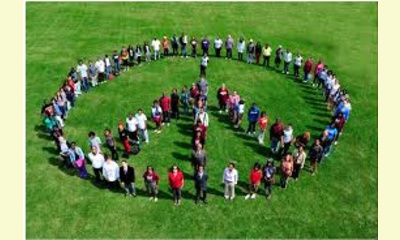|
|
Peace Coalition: How to make Rockford a city of peace (USA)
an article by Nancy Kalchbrenner, president of Rockford Rotary and Linda L. Johnson, Rockford Rotarian, Opinion for Rockford Register Star (abridged)
For more than a decade Rockford has celebrated International Day
of Peace in the month of September. Participation has grown to
more than 40 groups providing a wide variety of peace-related
activities across our community throughout September and spilling
into other months of the year. 
click on photo to enlarge
We encourage you to join the culturally diverse network of local
citizens for this year’s “Who Will You Make Peace With?” events that
acknowledge and foster peace.
International Cities of Peace (InternationalCitiesOfPeace.org) is a
global, non-profit organization headquartered in Dayton, Ohio,
with a goal to have 100 cities across the world designated as “Cities
of Peace” by the end of 2014 and 1,000 “Cities of Peace” identified
by 2020. It has long been the desire of peace-minded members of
our community to have Rockford become one of the first 100, and
the Rockford Rotary Club is proud to lead the application process.
“What is a City of Peace?” you may be asking. The United Nations
has suggested that for peace to prevail, a community needs to do
the following:
* Foster a culture of peace through education
* Promote sustainable economic and social development
* Promote respect for all human rights
* Ensure equality between women and men
* Foster democratic participation
* Advance understanding, tolerance, and solidarity
* Support participatory communication and the free flow of
information and knowledge
Promote international peace and security.
“How does a city become a City of Peace?” International Cities of
Peace outline four basic steps to the application process. Rockford
Rotary, in collaboration with other community members, has begun
the process of:
1. Intention (a letter with supporting
organizations/individuals.)
2. Association (a “Culture of Peace” working plan.)
3. Progress (measurable goals and updates.)
4. Proclamation.
Rockford Mayor Larry Morrissey and the City Council will announce
the Proclamation of the Intention to be a City of Peace at Monday
night’s City Council meeting.
“Why did the Rockford Rotary Club decide to initiate this process?” .
. . Our six areas of focus are in complete alignment with
International Cities of Peace: Prevention and resolution of conflicts
and the promotion of peace; prevention and treatment of disease;
water cleanliness; mother and child health; basic education and
literacy for all; and economic and community development.
At a time when all of us are daily confronted with, and concerned
about, peace in our world and in our own backyards, the Rockford
Rotary Club is proud to stand with our other local Rotary clubs, our
mayor and City Council, and a culturally diverse group working
diligently to create a culture of peace in Rockford and surrounding
communities.
Please join us and show your support by participating in Peace
Month recognition and celebration events. Ask yourself “Who Will I
Make Peace With?” and put that into action for our community and
world.
For more information about Peace Month activities visit connect2peace.org.
|








|
DISCUSSION
Question(s) related to this article:
What is a culture of peace city, and how does one become one?
* * * * *
LATEST READER COMMENT:
I believe that the development of a network of culture of peace cities can be a decisive factor in the transition from a culture of war to a culture of peace based on a profound reform of the United Nations system. The following are excerpts from my book World Peace through the Town Hall.
My experience working in the United Nations system for ten years and observing it closely for seven years since my retirement makes me optimistic that the UN system is capable of managing a transition to the culture of peace. The various specialized agencies that deal with health care, education, food and agriculture, science, communication, not to mention technical questions such as aviation, shipping, atomic energy, etc. are staffed by a capable international secretariat with experience in the day-to-day management of global issues. The UN General Assembly, as well as the international assemblies of other agencies such as the General Conference of UNESCO, provide important forums. Even the Security Council, the World Bank and the International Monetary Fund which are now in the hands of a few powerful states and used to support their culture of war could play important roles in the transition to a culture of peace if they were transformed under control of "we the peoples" instead of the state.
For the reasons given throughout this book, a global network of local authorities is the best chance for an international political force independent of the nation-state that could take responsibility for the United Nations and direct it towards a culture of peace.
In summary, the cause of the United Nations seems hopeless for a culture of peace as long as it is under the control of the nation-states of the world with their culture of war.
Without being able to predict a precise date, we can expect within the next few decades that the American Empire and the globalized economy associated with it will crash as did the world economy in 1929 and the Soviet economy in 1989.
A global crash sets the stage for two possible political solutions which are diametrically opposite. One is a strengthening of the culture of war at the level of the state into fascism which was the predominant reaction in the 1930's. . ...more.

|
|









